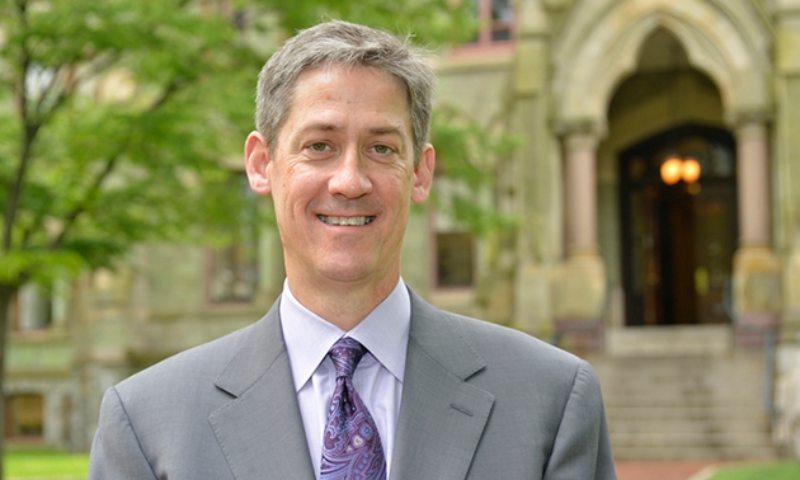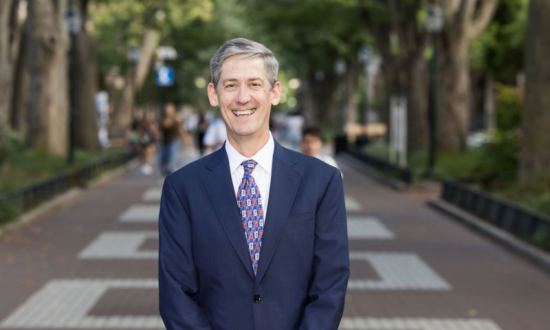Named Penn’s first SVP & University CIO in 2013, Tom Murphy is responsible for the central IT organization that plans for, builds, acquires, develops and supports infrastructure, cybersecurity and enterprise solutions and services for faculty, researchers, students, staff and alumni to further the pedagogy, research and administrative missions of Penn. Tom is accountable for the strategic evolution, integration and effective use of computing resources across 12 schools, 40+ centers, and 1000+ IT professionals. Tom is a recognized leader in IT. In 2010, his peers elected him to the CIO Hall of Fame. The Global CIO Executive Summit has twice named him a Top 10 Breakthrough Leader. Over the years, his teams have been recognized as the Best Places to Work, for Innovation, and for Diversity.
Recently, in an exclusive interview with CIO Magazine, Tom shared his professional trajectory, insights on the evolution of the CIO role over the last few years, personal hobbies and interests, future plans, words of wisdom, and much more. The following excerpts are taken from the interview.
Hi Tom. How did you first become interested in technology and what propelled you into it?
It was a complete fluke, and I wonder if it is possible today. I did not touch a computer during college. In 1984 I started as a front desk manager-in-training at Marriott Hotels & Resorts. 12 weeks into that role I met the individual Mr. Marriott chose to lead a team automating the front desks from keys to computers. He wanted hoteliers, not IT, to do the work, so Marriott would not lose their high-touch customer service. I was reassigned to Corporate HQ and started on the help desk. I moved into project management, eventually leading the entire team as Director of Property Management systems and Telecommunications.
What do you love the most about your current role?
Leading people and challenging them to achieve more than they thought possible. Embedding IT into the business strategically and tactically and driving tangible results in partnership. Seeing former staff move into C-level roles through the years.
How are you leveraging emerging technologies such as AI, blockchain, and the Internet of Things (IoT) to drive innovation and improvement in IT services?
IoT has been leveraged for years, so not much to say there. Blockchain is limited beyond research. AI Is a focus now. We kicked off IT and Administrative pilots focused primarily on streamlining workflows and magnifying data analytics in our administrative units. We developed guidelines for use and now have an institutional-wide focus in this space. We are working with vendors to bring their enhancements into Penn, and leveraging closed GPTs for use across campus. We are also working to democratize access for all of campus, studying bias and ethics associated with GenAI. My main goal is to offset the inevitable deskilling of staff and provide reskilling to create job resiliency going forward.
How have you seen the role of the CIO change in the last 5-10 years, and what changes do you see on the horizon in the years ahead?
I have been doing this work for 40+ years. The current generation of senior executives grew up with technology and recognize the value of investment as our work creates innovation platforms, efficiency gains, and visibility across the institution, and we now have much more influence over institutional priorities. We spend more time with the Boards of Directors, beyond the obligatory Information Security updates. We present some of the most audacious and strategic plans.

What role do you see IT playing in supporting interdisciplinary research and collaboration, and how do you facilitate partnerships with external organizations and industry partners?
IT is in the unique position of seeing across the entire enterprise. We connect dots across divisional silos that others cannot see. Whether it’s tools, people, research, shared compute and storage, redundant activities, etc. One example is our PARCC program, Penn’s Advanced Research Compute program, intended to provide much more powerful compute to support research priorities including climate change, quantum computing, energy science, analytics and much more. We have worked to build the platforming, tooling and data center, and negotiated with many outside vendors, including Nvidia, to procure the latest hardware and software. Originally the intent was to build a separate team to do this work. Our expertise in these spaces allowed us to engage and become primary partners to the team building PARCC. Our intention is to offer access to advanced compute to all researchers, faculty and students across Penn.
Is there a particular person you are grateful for who helped get you to where you are?
My wife, Lisa. My success has been enabled by her willingness to uproot the family six times to six states and “start over”.
What does the term “authentic leadership” mean to you?
This is a phrase that can cause a lot of eye-rolling. To me, this is about establishing organizational values that define the expected behaviors within my organization, and leading from the front, amplifying those values through our “rituals” (management meetings, all-staff meetings, in-office tailgates, etc). I am direct, honest and candid, consistent in my leadership, begin from a place of empathy, encourage risk taking and willingness to change course quickly (no IT organization can be great operating with fear of making a mistake). I see my role as creating an environment where people can do their best work. I have a trick I have used for years. We all have a real life and real issues. I try not to bring that into my role as CIO. When I walk through the doors of the office, I remind myself that I am here for my team, not for me, and I leave my baggage at the threshold.
What are some of your passions outside of work? What do you like to do in your time off?
I am a serious cyclist and broken-down triathlete. I also like to exercise my creative side. I draw, scrapbook, build Legos, etc. I exercise regularly, which is critical to maintaining my sanity!
What is your biggest goal? Where do you see yourself in 5 years from now?
I’m at a point in my career where I have accomplished far more professionally than I ever could have imagined. My goal is to continue to build the leadership competencies of my team so when I retire the transition will be smooth and the team can take what we have built to the next level. My goals are to provide mentorship and coaching to the next generation of IT leaders and continue public board work which has been very rewarding.
What advice would you give to aspiring technology leaders who aim to make a positive impact in their organizations and the industry as a whole?
It starts with you. Your behaviors define who you are and what you accept as a leader. You have a choice about how you show up. Empathy, honesty, consistency and opportunity are foundational to building a great organization. Yours is a business role. Don’t lose sight of that. And don’t be a dick.

